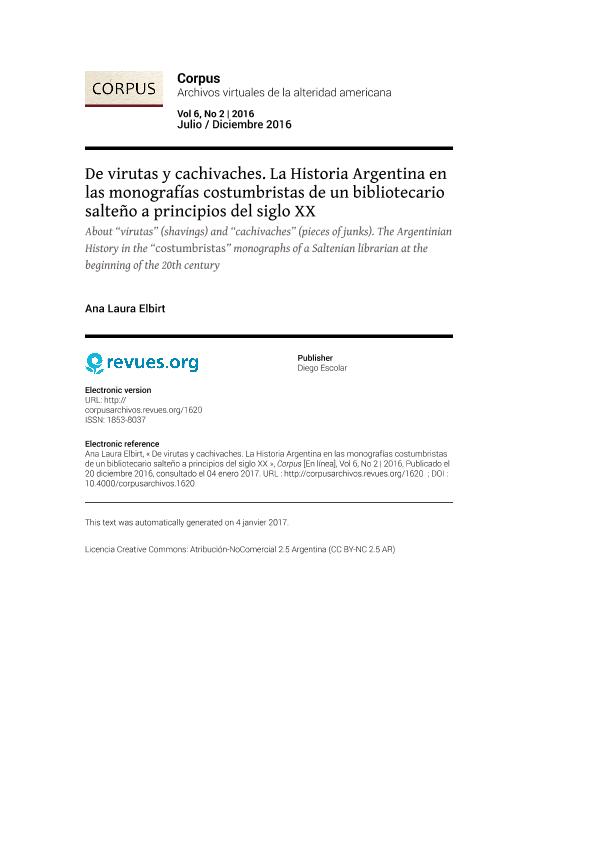Artículo
Francisco Centeno (1862-1944) es un “bohemio provinciano” de Salta que se desempeñó como Director de la Biblioteca de la Cancillería desde 1884 hasta 1916. Tras su retiro del Ministerio de Relaciones Exteriores de la Nación publicó tres tomos de Virutas históricas, una compilación de sus monografías costumbristas y archivos de la diplomacia argentina. En este artículo trabajamos sobre dos metáforas recurrentes en la escritura de Centeno, las “virutas” y los “cachivaches”. Ambas refieren a una manera de imaginar a la nación desde un espacio periférico y fronterizo: la provincia de Salta, en el noroeste argentino. Este bibliotecario interpreta que la Historia Argentina desecha algunos acontecimientos alejados de la región rioplatense. Por esta razón, construye un relato histórico a partir de estos residuos. Estos escritos conforman actualmente un documento extraordinario, aunque escasamente estudiado. Dicho documento permite entender las distintas miradas sobre la Argentina desde una recuperación del espacio andino (actual noroeste argentino, Bolivia, Perú y norte de Chile), dimensión geográfica precedente a la conformación del Estado nacional. La obra de Centeno permite, además, indagar las vinculaciones entre la literatura salteña y la peruana en la segunda mitad del siglo XIX, con énfasis en la figura de Ricardo Palma, escritor limeño que funda el género tradicionista en Hispanoamérica. Por último, los escritos de Centeno ayudan a comprender el ensayismo fundacional argentino y las diversas maneras de construir una literatura nacional diferente a la versión hegemónica propuesta desde Buenos Aires a principios del siglo XX. Francisco Centeno (1862-1944) is a "provincial bohemian” from Salta who served as Director of the library of the Foreign Affairs Ministry from 1884 until 1916. After his retirement from the Ministry, he published three volumes of Historic Virutas, a compilation of his costumbristas monographs and files of the Argentinian diplomacy. In this article we work on two recurring metaphors in the writing of Centeno, “virutas” and "cachivaches”. Both expressions refer to a way of imagining the nation from a peripheral and border area: the province of Salta, in the Northwest of Argentina. This librarian believes that the History of Argentina, that is in capital letters, discarded some events taking place away from the Rio de la Plata region. That is why this librarian turned writer elaborates a historical narrative that factor-in these omissions. This narrative constitutes today an extraordinary document, albeit barely studied. This document allows an understanding of the different views on Argentina starting from a recovery of the Andean space (current Northwest of Argentina, Bolivia, Peru and North of Chile). This geographical dimension preceded the conformation of the national State. The work of Centeno allows also researching the linkages between Saltenian and Peruvian literature of the second half of the 19th century, with emphasis in the figure of Ricardo Palma, a writer from Lima who founded the traditional genre in Latin America. Finally, the writings of Francisco Centeno, helps to understand the Argentine founding essays and ways to build a national literature different from the hegemonic version proposed from Buenos Aires at the beginning of the 20th century.
De virutas y cachivaches : la Historia Argentina en las monografías costumbristas de un bibliotecario salteño a principios del siglo XX
Título:
About “virutas” (shavings) and “cachivaches” (pieces of junks). The Argentinian History in the “costumbristas” monographs of a Saltenian librarian at the beginning of the 20th century
Fecha de publicación:
20/12/2016
Editorial:
D. Escolar
Revista:
Corpus
ISSN:
1853-8037
Idioma:
Español
Tipo de recurso:
Artículo publicado
Clasificación temática:
Resumen
Palabras clave:
Historia
,
Literatura
,
Nación
,
Salta
Archivos asociados
Licencia
Identificadores
Colecciones
Articulos(UE-CISOR)
Articulos de UNIDAD EJECUTORA EN CIENCIAS SOCIALES REGIONALES Y HUMANIDADES
Articulos de UNIDAD EJECUTORA EN CIENCIAS SOCIALES REGIONALES Y HUMANIDADES
Citación
Elbirt, Ana Laura; De virutas y cachivaches : la Historia Argentina en las monografías costumbristas de un bibliotecario salteño a principios del siglo XX; D. Escolar; Corpus; 6; 2; 20-12-2016; 1-20
Compartir
Altmétricas




